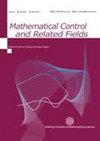含卡普托分数阶导数系统中噪声输入的动态估计。连续测量部分相位坐标的情况
IF 0.9
4区 数学
Q1 MATHEMATICS
引用次数: 0
摘要
研究一类具有卡普托分数阶导数的非线性微分方程系统的未知输入估计(重建)问题。关于系统位置的信息可用于观测,但只能测量系统的一部分参数。给出了测量所有相位坐标的情况。测量是连续的,测量得到的数据是有噪声的。所考虑的问题是病态的,为了解决它,我们使用了动态反演的方法。它是基于正则化方法和位置控制理论的结构。特别地,我们使用了Tikhonov正则化方法(也称为平滑泛函方法)和Krasovskii极值瞄准方法。估计未知输入的方法意味着引入一个辅助系统(一个模型),该系统具有形成控制的适当规则。该估计算法对未知输入给出近似,在信息噪声和计算误差下保持稳定。作为说明所阐述的技术的一个例子,使用人类免疫缺陷病毒病的生物学模型进行模拟。仿真结果表明了该方法对实际过程中不可观测参数的在线估计的重要性。本文章由计算机程序翻译,如有差异,请以英文原文为准。
Dynamical estimation of a noisy input in a system with a Caputo fractional derivative. The case of continuous measurements of a part of phase coordinates
The problem of estimating (reconstructing) an unknown input for a system of nonlinear differential equations with the Caputo fractional derivative is considered. Information on the position of the system is available for observations and only a part of system's parameters can be measured. The case of measuring all phase coordinates is also presented. The measurements are continuous and the data obtained in them are noisy. The considered problem is ill-posed and, to solve it, we use the method of dynamic inversion. It is based on regularization methods and constructions of positional control theory. In particular, we use the Tikhonov regularization method also known as the smoothing functional method and the Krasovskii extremal aiming method. The approach to estimating an unknown input implies introducing an auxiliary system (a model) with an appropriate rule of forming a control. The proposed estimation algorithm gives approximations of an unknown input and is stable under informational noises and computational errors. As an example illustrating the elaborated technique, a biological model of human immunodeficiency virus disease is used for simulation. The simulation results demonstrate the importance of the approach to on-line estimating unobservable parameters in real processes.
求助全文
通过发布文献求助,成功后即可免费获取论文全文。
去求助
来源期刊

Mathematical Control and Related Fields
MATHEMATICS, APPLIED-MATHEMATICS
CiteScore
2.50
自引率
8.30%
发文量
67
期刊介绍:
MCRF aims to publish original research as well as expository papers on mathematical control theory and related fields. The goal is to provide a complete and reliable source of mathematical methods and results in this field. The journal will also accept papers from some related fields such as differential equations, functional analysis, probability theory and stochastic analysis, inverse problems, optimization, numerical computation, mathematical finance, information theory, game theory, system theory, etc., provided that they have some intrinsic connections with control theory.
 求助内容:
求助内容: 应助结果提醒方式:
应助结果提醒方式:


